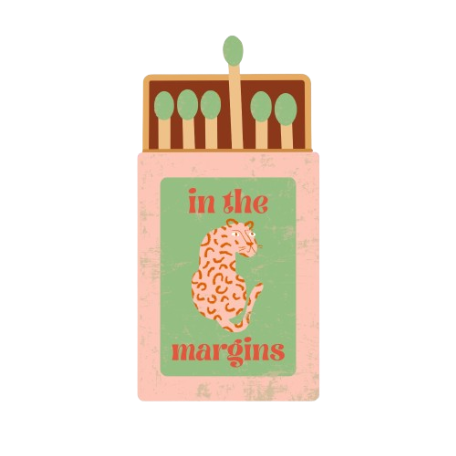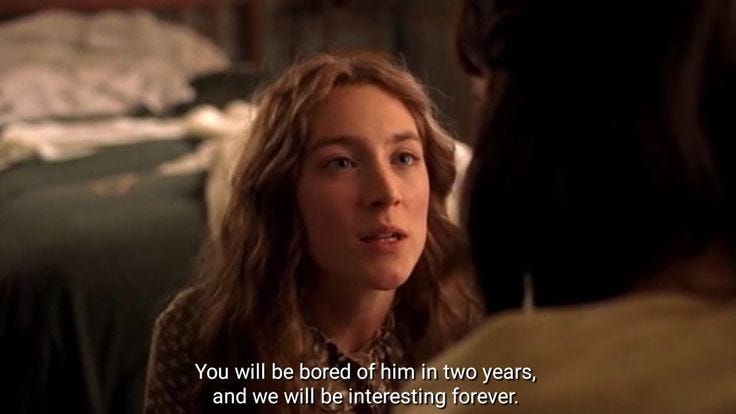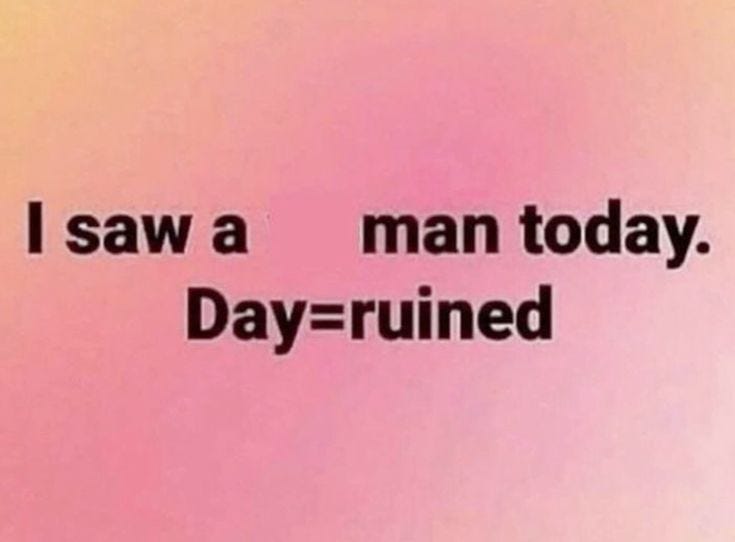In The Margins: men are the villains, again
On the deconstruction of your favourite male characters
Have you ever considered that the brooding, dark, handsome male character with a mysterious past might actually just be … a twat?
These male love interests have been sold to us through pop culture, the image of Hugh Grant sulking behind a cigarette or the moody intensity of Christian Grey. It’s almost always the same plot: the man is rude to everyone except for the female protagonist who persists because he is so handsome and ultimately ‘softens’ his heart, changing his ways for good.
I can admit I have fallen victim to these men before - when I was 13 watching The Vampire Diaries, or when I was 15 and obsessed with the Duke of Hastings in Bridgerton. All my life, I have been nothing if not obsessed, and these characters are always set up perfectly for young girls to fixate their obsessions upon. I am convinced that they are written scenes exclusively with the image of corresponding fan edits in mind.
Yet this idea of desiring the dangerous archetype dates back to early literature. Lord Byron introduced his own genre of ‘Byronic heroes’ in the early 1800s, a category of “melancholy and rebellious young [men], distressed by a terrible wrong [they] committed in the past”1 - an invented character archetype to dismiss his own self-indulgent behaviours as alluring, perhaps? Every Literature student that has studied Byron knows that he was famously described as ‘mad, bad, and dangerous to know’, and yet, rather than a warning, his reputation became an invitation - one that is so widely accepted in modern-day romantic leads.
This later developed into a more explicit archetype called the ‘Dark Triad’, a psychological term for three interrelated traits: narcissism, Machiavellianism, and psychopathy. A study that asked 2,370 women to choose between two pictures - one of a man with ‘Dark Triad’ features and one of a man without - proved that many women found the Dark Triad more attractive2. This speaks to a deeply ingrained allure to dominance and danger - but why? At what point does ‘complex and tortured’ just become plain exhausting and embarrassing?
It gets me wondering - is this who young girls think they deserve? Do they watch Jane The Virgin and feel programmed to crush on convicted, emotionally abusive Rafael Solano, when Michael Cordero is right there? It worries me that this starts a chain of events where girls seek the love they think they deserve, modelled by men who are treating their romantic partners horribly and teaching the idea that it is the woman’s role to ‘fix’ them.
Now, with a clear head, a nice boyfriend, and what I like to believe is at least half of my frontal lobe developed, I feel detached from and ready to destruct almost every male character in this absolute rant of a post. Stay with me, I promise I do get to a point later.
Sometimes, the hero isn’t who we thought he was.
The Hot Priest
My first take may be my most controversial, but I think the Hot Priest, despite being described as ‘a man written by a woman’ is simply just a man.
Andrew Scott’s portrayal transcended audiences and captured so many hearts. From the outset, the Hot Priest seemed to embody the usual qualities associated with dark, enigmatic love interest: he is handsome, sarcastically witty, brooding, and unavailable. He is presented as morally complicated, conflicted in his relationship with religion, and emotionally distant. Most enticing of all, and the reason he is branded as a ‘man written by a woman’ - he listens.
However, his inability to be a fulfilling partner to Fleabag suggests that his internal conflict is not something to be solved through love or even self discovery, but something that exists alongside his fundamental flaws - and oh, how many he has.
He exploits Fleabag’s emotional needs and fragile self-worth, deliberately maintaining an emotional distance and offering only fleeting moments of connection before withdrawing them quickly. This creates an unhealthy power dynamic in which Fleabag is left constantly chasing after his momentary love. His refusal to be vulnerable or share his own emotional burden with Fleabag places him in a dominant position, forcing her to carry the emotional weight of their relationship alone. Worst of all, though, is his sarcasm. No one likes a sarcastic person.
This breaks down Fleabag’s character as a woman, already broken down from her unresolved grief and trauma, who is now completely dependent on receiving love from this man in order to validate her own worth. He takes a hammer to these remaining pieces of Fleabag in the confession scene in which she admits that she is an empty shell of a person who seeks guidance and stability from others. The Priest, instead of offering comfort or understanding, delivers the sexually charged, cold line, “Kneel”, stripping her of any remaining autonomy or dignity. He holds the power and she is left, once again, begging for crumbs of affection. The emotional cruelty of this moment, despite being one of the most romanticised of the season, reduces Fleabag from a dominating character to a passive one. She is made to feel only valuable when someone else, particularly a man, chooses to grant her worth.
The Priest represents the dark side of the sought after trope: the allure of the ‘impossible’ man who, despite all his emotional complexity, is ultimately just preying on a woman’s vulnerabilities to maintain his own sense of emotional control. He is not a traditional villain, and it is easy to argue the opposing side, but his exploitation of Fleabag’s needs make him one of the most subtly damaging figures in the series, turning it from a comedy to a tragedy.
Theodore Laurence (Laurie)
In the 2019 film adaptation of Little Women, Timothée Chalamet’s character Laurie starts out as a charming, lovable, and idealistic romantic figure. His initial infatuation with Jo is one of dreams, with a prolonged friendship through childhood stabilising their connection.
However, as the characters age and mature, Laurie finds himself becoming more emotionally immature, nursing a wounded ego that he himself has bruised. Journalist Holly Blackford agrees that there is a “dangerous kinship between Laurie and the Byronic hero […] kept in check by the March influence in the early portions of the novel, he becomes increasingly Byronic.” (Blackford, 5)3. Laurie’s villainous tendencies don’t grow from malicious intent but from his male inability to grow emotionally.
The worst moment of Laurie’s is, of course, the proposal scene in which he declares that “I’d rather hang myself than realise this, Jo. I would rather be dead”. This line crosses from the realm of genuine emotion into emotional manipulation as he demands Jo’s sympathy by gaslighting her into believing that she will be the catalyst for his spiral into despair. Despite their relationship being built on foundations of deep friendship over many years, Laurie is quick to turn to resentment; most definitely the type of modern man who would respond that “you’re a bitch, I never liked you anyway”. He doesn’t fully process or respect Jo’s decision, but rather makes her feel guilty to validate his own hurt.
This shifts their relationship dynamic and creates an imbalance in which Jo has to manage not only her own feelings, but also Laurie’s wounded ego.
And then Laurie turns to her younger sister Amy! At first, he uses Amy as a rebound - a desire to regain some of the validation he lost to Jo. He becomes villainous not through violence or malice, but through emotional selfishness and an inability to have any respect for the women around him. He truly did not deserve to end up with either of them - in such a gorgeous story of sisterhood where Jo discourages marriage with the statement that “we [the sisters] will be interesting forever”, it becomes disappointing to see either girl settle for such a mediocre, childish man.
Dexter Mayhew
The Netflix Adaptation of One Day (2024) dominated social media for weeks, branded the new Normal People as people declared Leo Woodall the new white boy of the month. With his redemption in the final episode, a lost man mourning his wife that brought so many to tears, it becomes easy to forget that Dexter treated Emma terribly over the course of twenty years.
He takes Emma for granted, relying on her role as his emotional anchor when he needs it without reciprocating the same level of emotional investment for her. Whilst she cares for him throughout his grief, she notices his inability to be there for her and calls it out:
“But tonight there was stuff I really needed to talk to you about. About Ian and me. But I can’t talk to you anymore.”
The plot focuses on Dexter’s descent into arrogance and self-absorption that goes alongside his years of fame. It is always obvious that he is an emotional labour for Emma to carry. So why, despite all this, is he romanticised as a character as soon as he becomes a stable partner in the last few chapters? After two decades of selfishness and neglect, Dexter’s transformation into a grieving, self-aware man who finally cherishes Emma is designed to evoke catharsis. It shows women that these brooding men can change, we just have to suffer the consequences of their actions first?
Dexter’s final devotion feels earned because of his struggles and growth to eventual self-awareness, but this risks ignoring the years of harm he has caused in the run up to this. Emma’s character deserves recognition not as the woman who ‘fixed’ Dexter, but as someone whose strength, love, and boundaries allowed her to thrive despite his flaws.
Quick Fire Round
Damon Salvatore (The Vampire Diaries) - literally a murderer
Mark Darcy (Bridget Jones’ Diary) - emotionally absent and condescending
Edward Cullen (Twilight) - controlling, stalker, arguably a paedophile, also a murderer
Jacob Black (Twilight) - weird and slightly-paedophilic thing going on with Renesmee, emotionally immature, manipulative
Connell Waldron (Normal People) - emotionally neglectful, pressured Marianne to keep their relationship a secret, baaaad communicator
Duke of Hastings (Bridgerton) - deceptive, lack of accountability, and emotionally absent
Hardin Scott (After) - cringe (and fits under like every abusive stereotype, but the cringe is so bad)
Anthony Bridgerton (Bridgerton) - self centred, overbearing, unable to be emotionally intimate
Patrick Verona (10 Things I Hate About You) - ‘buying’ Kat as part of a bet, dishonest, emotionless
Noah Calhoun (The Notebook) - borderline stalker, manipulative, entitled, and not able to just let things go
I sound like a hater (I am) but it is truly worrying to see the constant regurgitation of the same emotionally abusive characters dimming the light in female protagonists’ eyes. Older generations always pass things like this off as ‘it was a different time’ - encouraging men to be arseholes wasn’t okay twenty years ago and it isn’t okay now. We’re the ones who suffer the consequences of this. These books, TV shows, and movies are everlasting, the characters existing for a long time after the final scene and available be revisited for decades to come. That allows for the revisiting of unhealthy relationship dynamics again … and again … and again.
Girls come to accept or even expect toxic behaviours - like emotional withdrawal, gaslighting, stalking, or controlling actions - as signs of passion. This isn’t even a ‘maybe they will’, they do, and I know that because I’ve grown up around it. When I was thirteen, my entire friendship ground was obsessed with Damon Salvatore and thought he was the perfect man - despite everything he does to Caroline and the way he manipulates and berates Elena constantly. When I was seventeen, everyone in my circle at sixth form watched Euphoria season 2 and had a mixed range of loves for various characters, as if they all aren’t terrible people. Even when I moved to university, I was so shocked at my flatmates and their love for Hardin Scott in After (this is seriously one I can never get behind)
These characters teach girls from a young age (because lets be real, TikTok is rampant with these men and girls are learning of them at a younger age than ever) that love is a struggle. They encourage the idea that love is a constant uphill battle where we’re always trying to save someone else, even at the expense of our own happiness.
At the end of the day, these men are just a giant ‘what if?’. What if the man who abuses you actually has a heart of gold beneath all his emotional baggage? What if he’s only mean to everyone else because he cares for you so deeply? What if his brooding silence is just him being misunderstood and not him being emotionally incapable of forming a healthy connection?
In reality, these men don’t translate well into real scenarios. The man snapping at waiters and talking over you isn’t about to surprise you with a private jet holiday to Bali. No, he’s just a guy who snaps at waiters and talks over you.
These men are not ‘deep’ or ‘misunderstood’. They’re work. And in this economy, who has the time for that anymore? We need to look beyond the brooding exterior and start asking: “what kind of love do I actually deserve?” I can guarantee that the answer is not emotional abuse from a ‘Byronic hero’. From page to real life treatment, women deserve better from men. If that means leaving the brooding bad boys in the past, so be it.
They can stay there, sulking in the corner.
Book Recommendations (for the man haters)
My Year of Rest and Relaxation by Ottessa Moshfegh
So Lucky by Dawn O’Porter
Gold Rush by Olivia Petter
How To Date Men When You Hate Men by Blythe Roberson
The Reasons That Induced Dr. Swift to Write a Poem Called The Lady’s Dressing Room by Lady Mary Montagu
How To Kill Men and Get Away With It by Katy Brent
I Hate Men by Pauline Harmange
Dictionary.com. “Definition of ‘Byronic Hero.’” Www.dictionary.com, 2019, www.dictionary.com/browse/byronic-hero. Accessed 10 Dec. 2024.
Marcinkowska, Urszula, et al. “Women’s Reproductive Success and the Preference for Dark Triad in Men’s Faces.” Evolution and Human Behaviour, vol. 37, no. 4, 2016, pp. 287–92. Science Direct.
Blackford, Holly. “Chasing Amy: Mephistopheles, the Laurence Boy, and Louisa May Alcott’s Punishment of Female Ambition.” Frontiers: A Journal of Women Studies, vol. 32, no. 3, 2011, pp. 1–40. JSTOR.















i love this so much
You are bloody beautiful this is so perfectly constructed and so so real